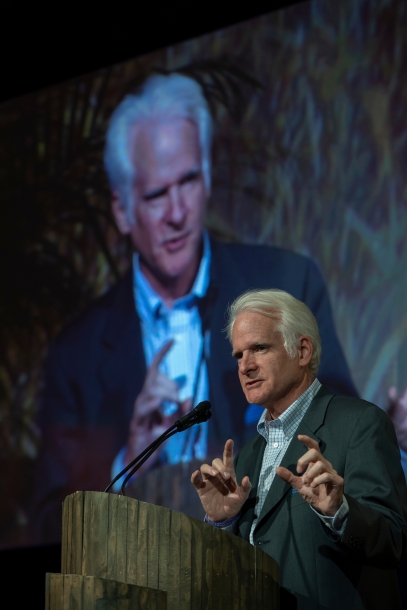You are here
What’s An Ant Worth?
As part of the global marketing of Hope in a Changing Climate, the award-winning film Halperin executive produced with a team from the Environmental Education Media Project, Halperin authored a series of blog posts from December 2009 to June 2010. The following dispatch is part of this series.
To learn more about the film and ecosystem restoration, see the Hope in a Changing Climate project.
Listening just now to E.O. Wilson, the esteemed biologist, talking about the sophistication of ant colonies I am reminded of an energized conversation I had some years ago on this topic. The only American businessman among nearly a hundred water engineers and wastewater managers from across the Soviet Union, our discussion was usefully lubricated by the quite famous Russian national beverage - locally produced, organic and quite potent.
As we cruised among the lakes and rivers of Northern Russia discussing the challenges of running bankrupt wastewater plants from St. Petersburg to Vladivostok, remembering the robustness of mostly invisible ant colonies was a useful counterpoint to the very visible and ongoing collapse of the Soviet economy. Though surely not a recommended approach for environmental protection, that collapse led to profound improvements in air and water quality as hundreds of immense plants were shuttered, along with their belching smokestacks and coughing drain pipes.
Fully understanding the core connections between environmental protection and economic growth remains a challenge around the world. While nothing reduces pollution quite like economic collapse, so too developed nations devote much higher percentages of GDP to environmental protection than do developing countries. American celebrants of the 40th anniversary of Earth Day note with pride how much has changed in America. The founder of the original Earth Day teach-in, Dennis Hayes, spoke with power and eloquence (and not a note or prompt) a few days ago – at the Ronald Reagan International Center. Yet Bill McKibben writes that we have utterly failed to address the environmental issue of our time – climate change.
At sessions before and after that dinner in the Reagan Center, participants in the “Creating Climate Wealth>” conference, sponsored by Richard Branson’s Carbon War Room, were challenged to identify short-term strategies for radically reducing carbon emissions over the next ten years across a variety of industrial sectors. The former President of Costa Rica, Jose Maria Figueres, set the tone by reminding participants that “there is no Planet B,” an effective pivot from British retailer Marks & Spencer’s “Plan A” for sustainability.
I participated in a number of the conference sessions, after earlier in the week presenting EEMPs “Hope in a Changing Climate” documentary at the National Forest Service and on the National Mall. Not surprisingly, given the focus on harnessing the power of entrepreneurs to address climate change, there was not much discussion of the post-Soviet solution to environmental protection. There was little discussion of the benefits of buying less, flying less, driving less. General (Ret.) Wesley Clark did note, however, that the power of entrepreneurship to build a green economy is likely to run into heavily entrenched economic and political forces quite determined to defend with their previously acquired “climate wealth.”
So the complex connections remain. Is the issue that we don’t yet fully price environmental externalities into the costs of our goods and services? Is it that we don’t yet fully value ecosystems, that we subsidize the price of a 2x4, but not the inherent value of a standing tree? Can we, at the end of the day, buy our way out of the problem?
-- Jonathan J. Halperin

